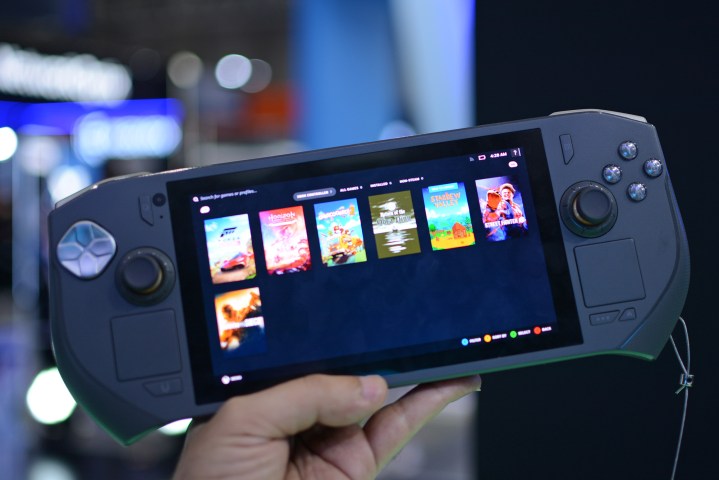
It’s a promising year for handheld consoles. In addition to the refreshed MSI Claw 8 AI+ and the Asus ROG Ally X, Zotac is set to debut its first Windows-based handheld gaming console. While the company is renowned for its Nvidia graphics cards, it also has substantial expertise in manufacturing mini PCs. This background likely contributed to its confidence in developing a handheld console of its own, which is essentially a mini PC paired with a display and controllers.
Unveiled at this year’s Computex, the new Zotac Zone positions itself against the current range of handheld gaming consoles. Despite still being in the preproduction stage, Zotac provided me with early access to the device, allowing me to spend some time testing it out.
Like the Steam Deck, only better
Zotac’s new handheld seems inspired by the Steam Deck, featuring similarly parallel joystick placement and dual trackpads. Despite being marginally larger on paper, it feels compact and comfortable to hold. The design showcases light gray aesthetics, consistent with Zotac’s graphics card lineup, and includes gold accents beneath the joysticks and on the Zotac logo along the right edge. The all-plastic casing has a smooth matte finish, with a subtle texture in the grip area for added comfort.

Zotac’s use of Hall effect joysticks is a significant advantage, offering superior accuracy and responsiveness while being more resistant to stick drift compared to traditional joysticks. In addition to the joysticks, the handheld features a D-Pad and standard ABXY buttons. There are also additional keys for Select and Start functions, as well as a dedicated button to launch Zotac’s proprietary software, which unfortunately wasn’t ready during the showcase. The console is also equipped with a front-facing camera that supports Windows Hello for secure login.

One feature that stood out to me was the inclusion of jog dials positioned beneath each joystick, which can be configured for various functions like adjusting volume, scrolling webpages, and increasing screen brightness. Although they were somewhat unstable on the preproduction unit, these small touches can significantly enhance the overall user experience.
The shoulder buttons felt satisfying, and I was particularly impressed by the two-stage trigger settings — a first for handheld consoles. This feature allows you to switch between long and short travel distances, depending on the game you’re playing. Additionally, the back of the device features two programmable buttons and a kickstand that’s perfect for propping it up on a desk.

On the top, you’ll find the power button, volume rocker, a USB 4.0 Type-C port, and a 3.5mm audio combo jack. There’s also a secondary USB 4.0 Type-C port at the bottom, along with a microSD card slot. The inclusion of USB ports on both the top and bottom is a thoughtful touch, providing flexibility for playing while charging. The speakers are positioned at the bottom and produce decent sound quality, though I would have preferred front-firing speakers for a better audio experience.

The Zone’s display features a 7-inch screen, a common size for handheld consoles. However, it stands out with an AMOLED panel boasting a 1080p resolution, a 120Hz refresh rate, and a peak brightness of 800 nits. This combination makes it superior to most other handheld consoles on the market. The only other handheld that offers an OLED is the Steam Deck, but that comes with a lower 800p resolution. Although the display on the Zotac Zone lacks support for variable refresh rates, it manages to excel in delivering sharp text, vibrant colors, and ample brightness.
Performance woes

The handheld gaming console is powered by the AMD Ryzen 7 8840U processor featuring Radeon 780M graphics. This robust chip comes with eight cores and 16 threads, and is capable of reaching boost clock speeds of 5.1 GHz. It also includes a dedicated Neural Processing Unit (NPU) to optimize AI workloads. Zotac plans to release the console in a single configuration initially, offering a 512GB PCIe Gen 4.0 SSD and 16GB of LPDDR5x-7500 RAM. Notably, the SSD uses a standard 2280 format, which makes future replacements and upgrades straightforward for users.
I didn’t have much time to thoroughly test the performance, but I did manage to run Forza Horizon 5 on low settings. The game delivered quality textures and details, with only minor instances of tearing. I was intrigued by the option to enable AMD’s FidelityFX Super Resolution (FSR), so I attempted to activate it. Unfortunately, the game crashed while optimizing the settings, which meant that I had to reboot the console. I also tested Horizon Forbidden West on low settings, which provided a decent gameplay experience, though I expected a bit more from the hardware.
Another critical factor is the battery life. Zotac has opted for a 48 watt-hour battery, which is slightly larger than the 40Wh units found in both the Steam Deck and the ROG Ally. It will be interesting to see how this performs, particularly since the device features an AMOLED panel. This could potentially provide a marginally better battery backup, if not the best, compared to its competitors.
Initial impressions of the Zotac Zone are generally positive, though fine-tuning the software for optimal performance remains crucial. Zotac plans to release the Zone around September or early October. While the exact pricing hasn’t been confirmed, a representative indicated a target price of around $700, aligning it with the original ROG Ally featuring the Z1 Extreme chipset.

Additionally, Zotac intends to offer a range of accessories, including wrist straps, a carrying case, and a docking solution. The docking solution is particularly noteworthy, as it will feature USB Type-C and Type-A ports, an Ethernet port, HDMI output, and a compartment at the bottom for adding an M.2 SSD for storage expansion.
Editors’ Recommendations
Services Marketplace – Listings, Bookings & Reviews

